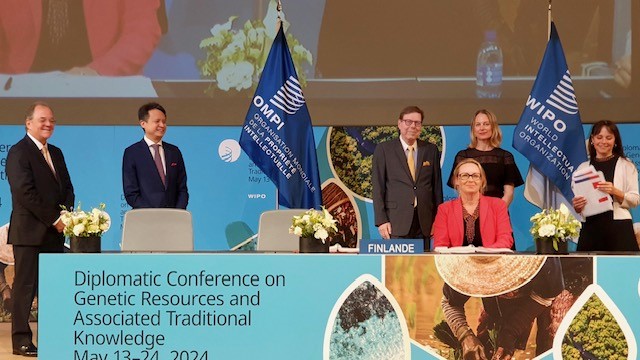New international treaty promotes transparency in the patent system

A new international legal instrument has been adopted at the World Intelletual Property Organisation WIPO Diplomatic Conference in Geneva. The international agreementregarding a disclosure requirement related to genetic resources aims to enhance the efficacy, transparency and quality of the patent system with regard to genetic resources and associated traditional knowledge.
The scope of the mandatory disclosure requirement is limited to patents. The patentability of inventions is not affected. Instead, the disclosure requirement provides information on inventions to the patent authorities. Furthermore, the information systems proposed under the agreement aim to prevent patents from being granted erroneously for inventions that are not novel or inventive with regard to genetic resources or traditional knowledge associated with genetic resources. The agreement promotes global sustainable use of genetic resources and traditional knowledge associated with genetic resources.
Negotiations in the World Intellectual Property Organization (WIPO) on an international agreement on intellectual property rights, genetic resources and traditional knowledge related to genetic resources spanned more than two decades. At the 2022 session of WIPO’s annual General Assembly, member states took a decision to convene diplomatic conferences to conclude an agreement in the course of 2024.
The concluded international legal instrument is particularly important for indigenous peoples, incorporating up to 600 million people in the world. The Treaty ensures on global level the role of Indigenous Peoples in the disclosure requirement and the international development of their rights by referring to the 2007 UN Declaration on the Rights of Indigenous Peoples.. The European Union and its Member States have adopted the UN Declaration on the Rights of Indigenous Peoples.
However, the legal treaty does not create new collective intellectual property rights for Indigenous Peoples. The content of the treaty on the disclosure requirement is an obligation of a technical nature that increases transparency and its purpose is to complement the set of agreements prepared to protect genetic resources and traditional knowledge.
Content of agreement
The scope of the disclosure requirement under the treaty is limited to patents. Under certain conditions, it requires patent applicants to disclose in their patent applications the country of origin of the genetic resources in their natural habitat (in situ). The treaty does not cover digital sequence data. If the country of origin of the genetic resources is not known, patent applicants should indicate the source from which the data originate (e.g. a genebank, database or book).
Patent applicants should also indicate the Indigenous Peoples or local community that provided the associated traditional knowledge on genetic resources. Where the information on Indigenous Peoples or local community is not known, the source of the associated traditional genetic information should be indicated.
The disclosure requirement promotes the consideration of genetic resources held by different states, Indigenous Peoples and local communities and the associated traditional knowledge as part of the patent systems.
The disclosure requirement applies above all to companies that develop biotechnology-based inventions. There are significant biotechnology companies in EU countries. For example, France, Spain, Germany and Italy as well as Finland ranked among the top ten countries in world in 2022 in the number of patents related to biotechnology.
The disclosure requirement may impact the use of Sámi traditional knowledge. The Sámi may have traditional knowledge associated with genetic resources involving the therapeutic and medicinal characteristics of plants. Traditional knowledge of the Sámi people shall also be included in patent applications if the conditions for the disclosure requirement are met. The disclosure requirement would improve awareness of genetic resources and their use, consequently promoting the preservation of traditional knowledge associated with genetic resources. Thus, the agreement also helps maintain the traditions of the Sámi culture.
Finland was represented at the conference by Ambassador Heidi Schroderus-Fox, Permanent Mission of Finland to Geneva; Anna Vuopala, Senior Ministerial Adviser, Ministry of Education and Culture; Stiina Löytömäki, Senior Specialist, Ministry of Economic Affairs and Employment; Hetti Palonen, Research Scientist, Finnish Patent and Registration Office (PRH); Anna Vitie, Counsellor, Juuso Moisander, First Secretary and Jussi Nummelin, First Secretary of the Permanent Mission of Finland to Geneva.
In addition, special adviser to the delegation Jukka Liedes as well as President Pirita Näkkäläjärvi, , Legal adviser Kalle Varis, and Secretary for International Affairs Inka Saara Arttijeff, Sámi Parliament in Finland participated in the delegation as experts.
Online links
Text of the international agreement that was adopted
WIPO Member States Adopt Historic New Treaty on Intellectual Property, Genetic Resources and Associated Traditional Knowledge (WIPO PR/2024/919 May 24, 2024)
Diplomatic Conference on Genetic Resources and Associated Traditional Knowledge

